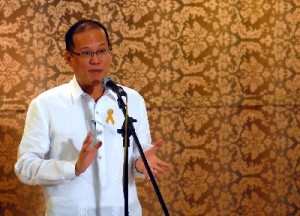Aquino: I won’t allow Sulu sultan to drag PH into war with Malaysia
GENERAL SANTOS CITY, Philippines—President Aquino on Wednesday declared that he would not allow the sultanate of Sulu to drag the country into a conflict with Malaysia.
A day after Malaysian forces launched a major operation to flush out the sultan’s armed followers at Lahad Datu town in Sabah, Aquino noted that the family of Sultan Jamalul Kiram III was engaged in a “propaganda war” ostensibly to elicit sympathy from Filipinos.
Addressing a campaign rally of Team PNoy, the President turned emotional as he explained his decision not to discuss the Sabah claim with Kiram unless the sultan first recalled his followers from Sabah.
“I appeal to you—we should be really clear on this—this incident is wrong. If this is wrong, why should we lend support to this? We should support what is right … which will lead us to brighter prospects; the wrong option will only bring us ruin. That’s it, that’s my simple message,” he said to applause from the audience.
“Let’s not forget: What they are pushing for is their right as so-called heirs of the sultan of Sulu. It’s not yet clear if their rights have been transferred to the Philippines. But we will all be affected by their conflict (with Malaysia),” the President lamented.
Article continues after this advertisementWomen spokespersons
Article continues after this advertisementA Palace official told the Inquirer that the President had been advised against further commenting on the Sabah standoff but still made these impromptu remarks during the rally to explain the government’s position in clear and unequivocal terms.
The official, who was not authorized to talk to reporters, admitted that the Palace’s position was becoming unpopular with the public, referring to Kiram using women as spokespersons.
In his speech, the President reiterated his call for the Kirams to stand down, order their followers to leave Lahad Datu, “and talk about your problem through a peaceful and orderly process.”
“Was that suggestion wrong?” he asked. “Is it right for others to seek support for those (at Lahad Datu) who are carrying arms that have led to killings?”
He admitted that the relations between Malaysia and the Philippines had been colored by the Sabah issue.
“Is it the interest of the Kirams, or the interest of the nation? Naturally, (we would prefer to achieve) both. This made me think, and we have truthfully studied this: They are claiming Sabah. Where did the problem that they no longer own it come from? Wasn’t this caused by their forebears who gave the lease or authority to the British to administer Sabah?” Aquino said.
“If they have a problem with the (lease) agreement, and if we are interested (to pursue this), we should talk about it through a peaceful dialogue,” he said. “If the agreement is flawed, let’s correct it.”
Conflict with China
Without mentioning China, the President noted that the country had a territorial dispute with a “big nation” but he said he never advocated the use of force to settle the issue.
“We brought the issue to the (international) court to press for our right as a state. Whichever community, wherever you are in the whole wide world, an armed group entering the (territory) is not the key to a peaceful and orderly dialogue?” he said.
In the last three weeks, Aquino admitted that he learned a lot from studying the Sabah conflict.
Jabidah massacre
He recalled that his father, the late Sen. Benigno Aquino Jr., had delivered a privilege speech on the Jabidah massacre in 1968 that later sparked the Moro revolt.
He cited the power of attorney mentioned by then Sen. Ambrosio Padilla dated Feb. 1, 1968, “allegedly executed by the heirs of the sultan of Sulu, in favor of President Ferdinand E. Marcos, recognizing the authority and power of the President to represent them in their settlement of their propriety rights over Sabah.”
“Therefore, I, as father of the nation, it is my obligation to safeguard the welfare of all Filipinos,” Aquino said, highlighting the decision of Malaysia to broker peace talks between his administration and the Moro rebels.
“Our relationship was becoming stronger when this (conflict) suddenly broke out … Someone in Malaysia will say: Is this how our relations with the Philippines will progress? We will always quarrel over Sabah? Are we fighting over this?”
